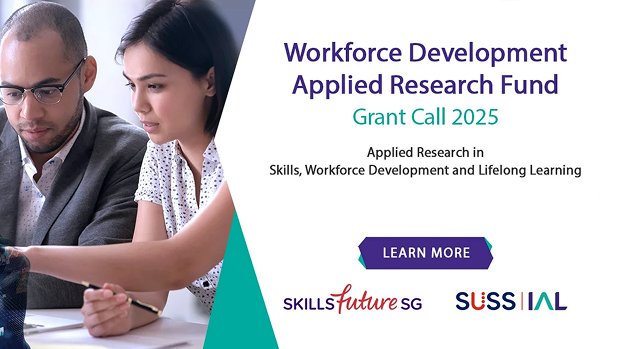The Workforce Development Applied Research Fund (WDARF), a national-level research fund offered by the SkillsFuture Singapore (SSG), aims to foster high quality and rigorous applied research in workforce development and lifelong learning to support the SkillsFuture Singapore's key thrusts and national-level policies. It encourages inter-disciplinary research and seeks to strengthen research capabilities, through leveraging both local and international expertise. The WDARF Grant Call is administered by the Institute for Adult Learning (IAL) on behalf of the SkillsFuture Singapore (SSG). The grant is awarded through an open, competitive bidding approach, where submitted proposals go through a technical expert review and evaluation, before they are presented to a Research Committee for approval.

Workforce Development Applied Research Fund (WDARF) 2025 Grant Call
The WDARF 2025 Grant Call is now closed for Expression of Interest (EOI) submission.
Previous Result
Grant Call 2020
Dialogical Inquiry: Developing Quantitative Instruments for Profiling Future Skills
Asst Prof Albert Kai Chung Lee, Nanyang Technological University
This project brings together two fields of research that rarely work together – social psychology and a socio-cultural perspective, both within the field of adult learning. In a small way, this project provides a means to make visible the assumptions, theoretical stances, and units of analysis embodied in the logic of various epistemological, ontological approaches that are otherwise assumed and, thus, silent. The project will move beyond multi-disciplinary research towards a transdisciplinary approach in the field of the science of adult learning, in Singapore and around the world.


Grant Call 2020
Digital Capacity Building for Own-account Workers in Singapore
Dr Carol Soon, National University of Singapore
The objective of this study is to advance the digital skills and competencies of own-account workers in Singapore through benchmarking a set of job-ready digital skills and mapping a framework for digital skills development. The project seeks to unlock the benefits of digitalisation for a segment of Singaporean workers who tend to be digitally low-skilled so that they too can participate meaningfully in the digital economy. Findings from the study will support the policymaking work of SkillsFuture Singapore (SSG), the SG Digital Office (SDO) and the National Jobs Council.


Grant Call 2019
Empowering Singaporean Workers to Transition, and Map Careers Better in the Future of Work through Open Loop Careers
Mr Poon King Wang, Singapore University of Technology and Design
The project is aimed at measuring changes in career circumstances and attitudes over time (12 months), as well as qualitative interviews which glean deeper insights on Singaporean workers' personal experiences.


Grant Call 2019
Enhancing Adult Learning Using a Mobile Micro-Learning Platform With Integrated Nudging Interventions: A Design-Based Research Approach
Associate Professor Oh Lih Bin, National University of Singapore
The proposal seeks to provide insights into the design of educational technologies that can trigger automatic cognitive processes for adult learners. First, adult learner archetypes will be developed by drawing on adult learning theories and literature. Following this, integrated nudging interventions will be designed based on cognitive load theory and nudge theory. Next, the study will validate the effects of tailoring nudging interventions to adult learner archetypes and also assess the impact of the platform on learning outcomes.


Grant Call 2019
Development and Evaluation of Building Resilience@Work Training among Healthcare Workers
Associate Professor Lau Ying, National University of Singapore
This study aims to evaluate the effectiveness of a self-paced training programme (that includes six online sessions, self-monitoring, homework, peer and therapist supports) on resilience, job engagement, intention to leave, employability, and work performance. This study also seeks to explore healthcare workers’ experience of the training programme.



